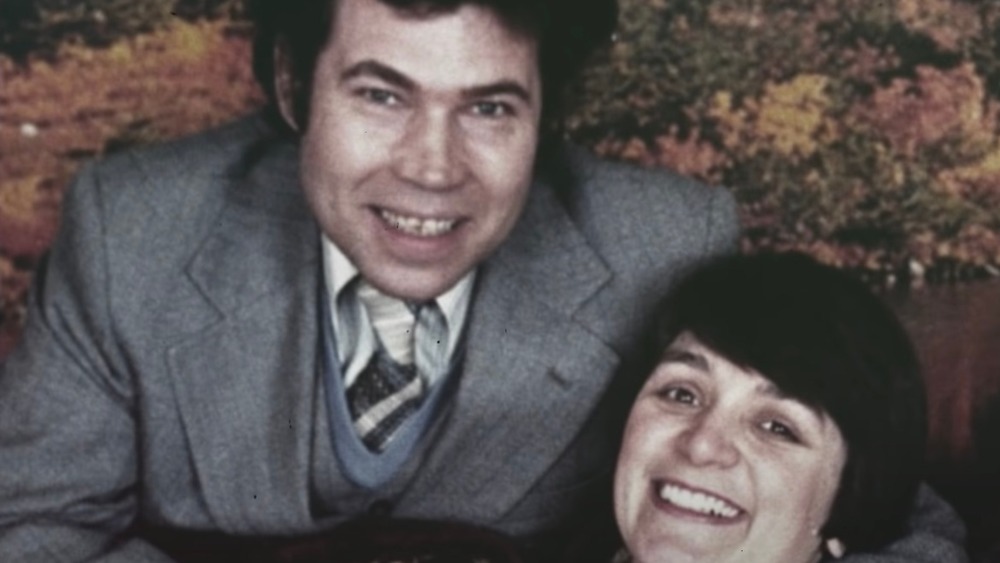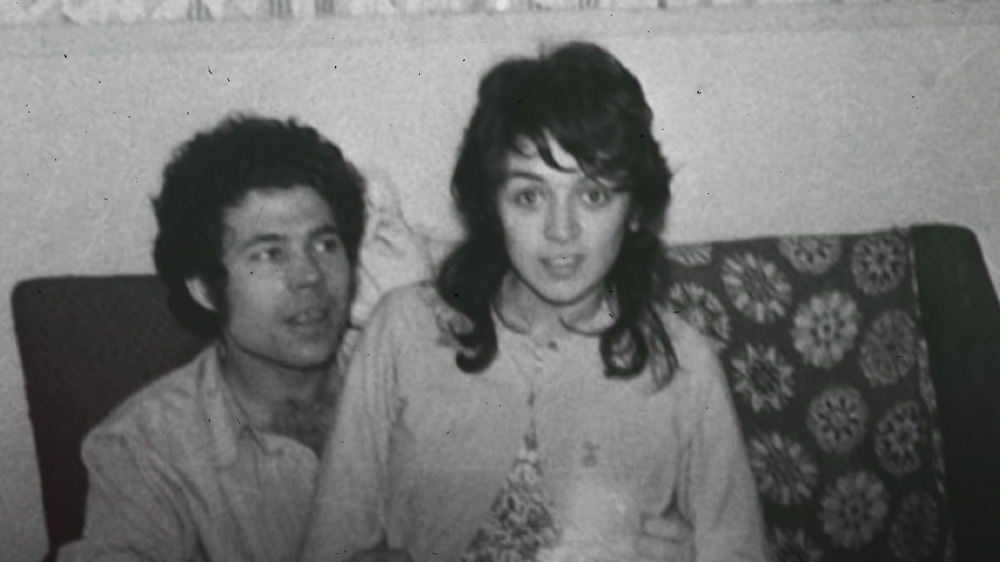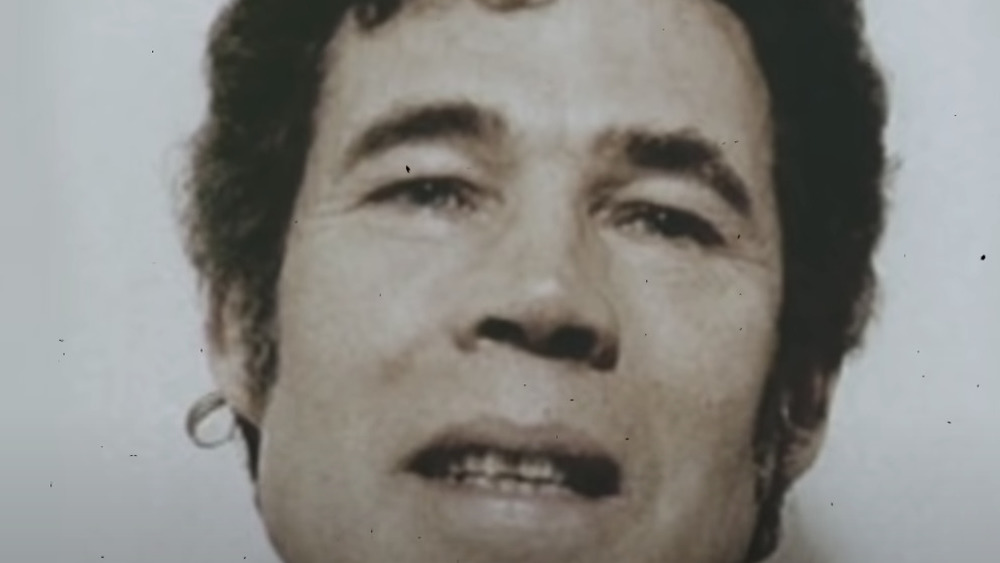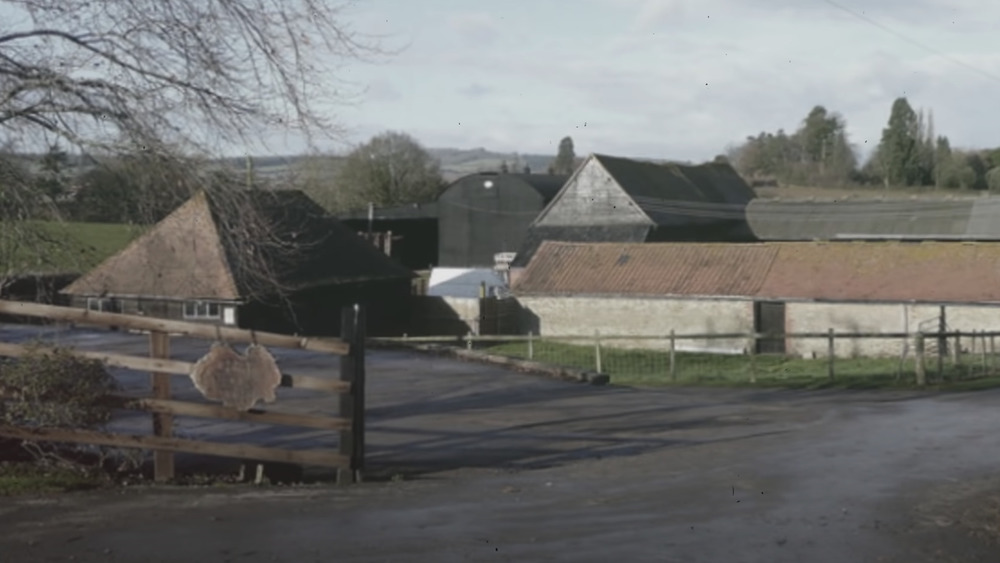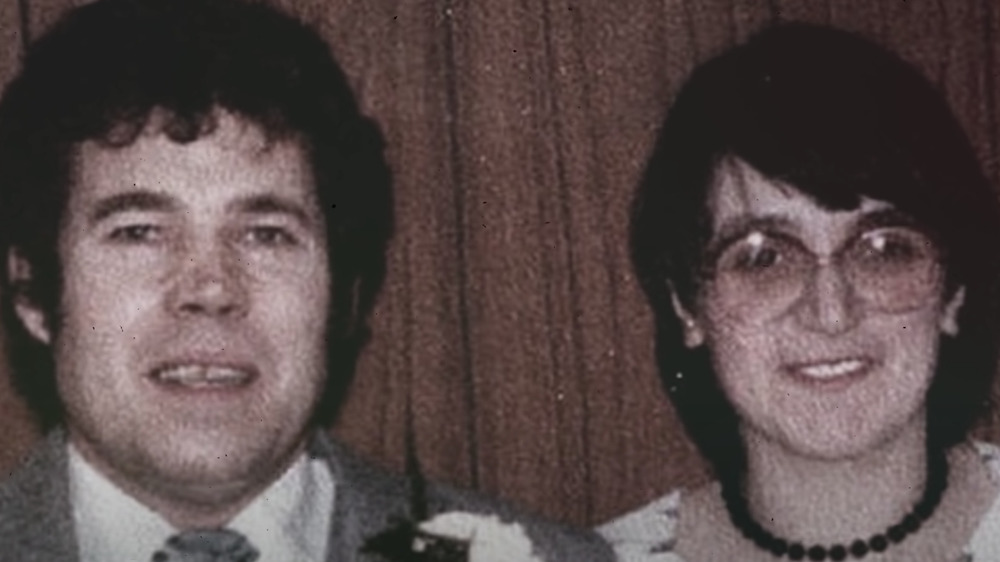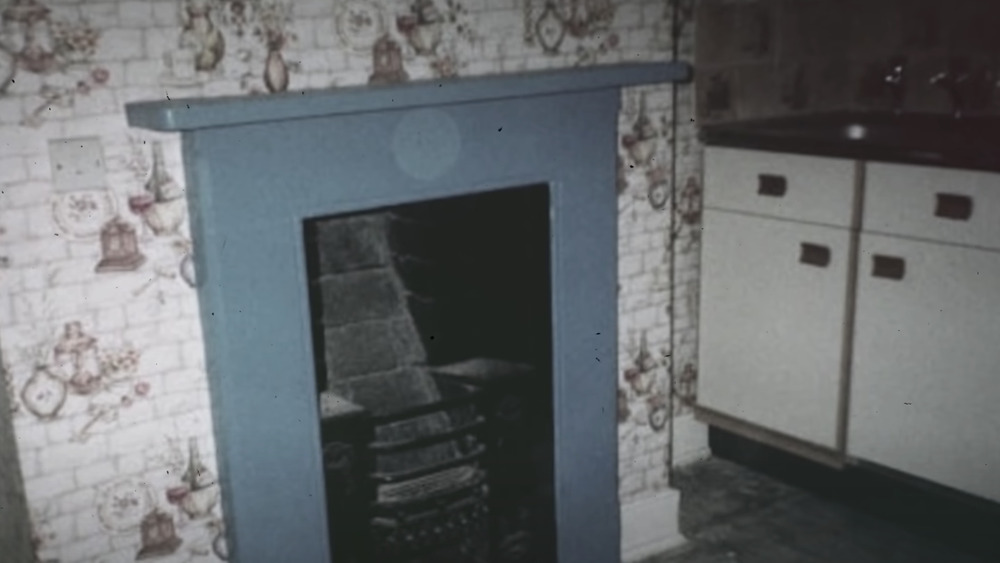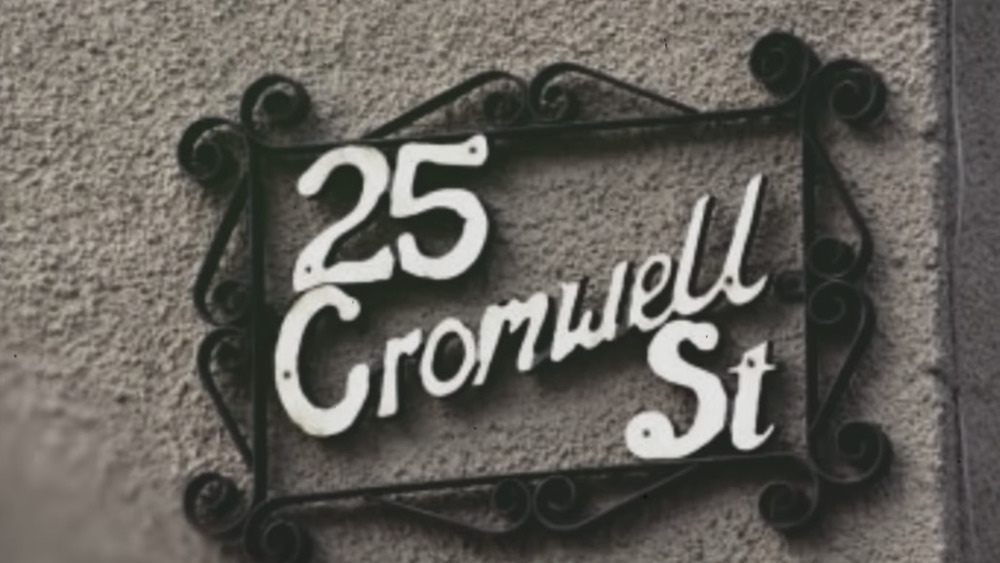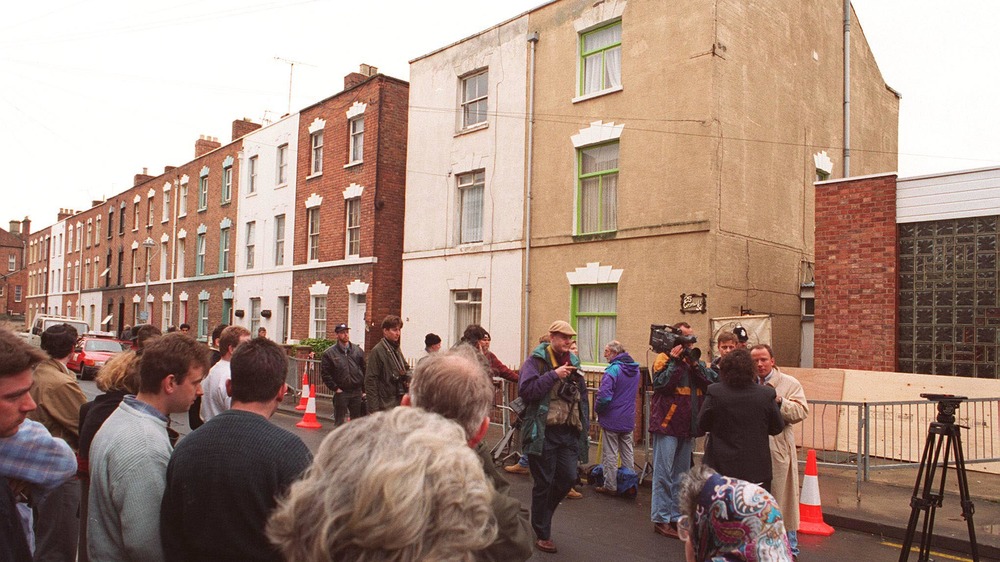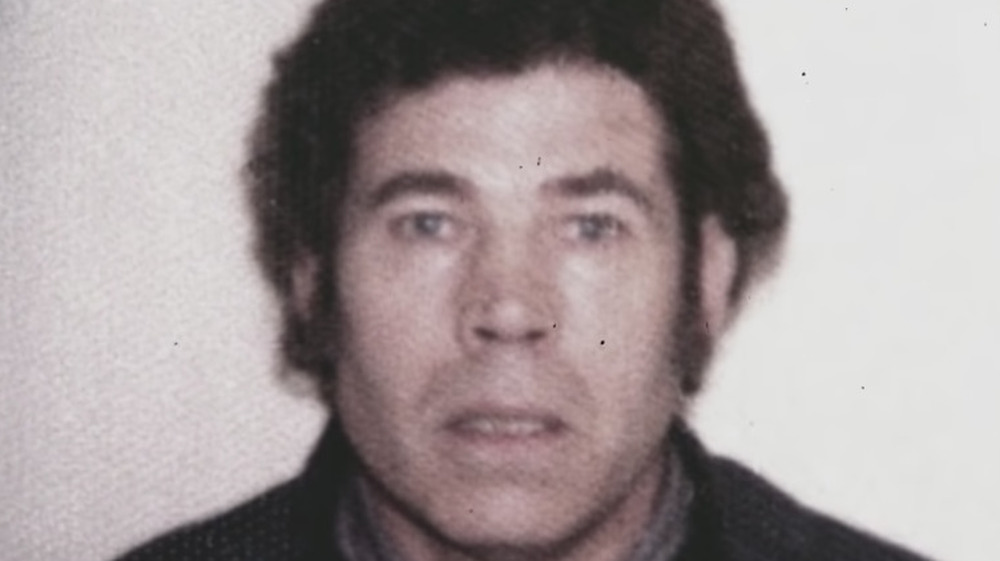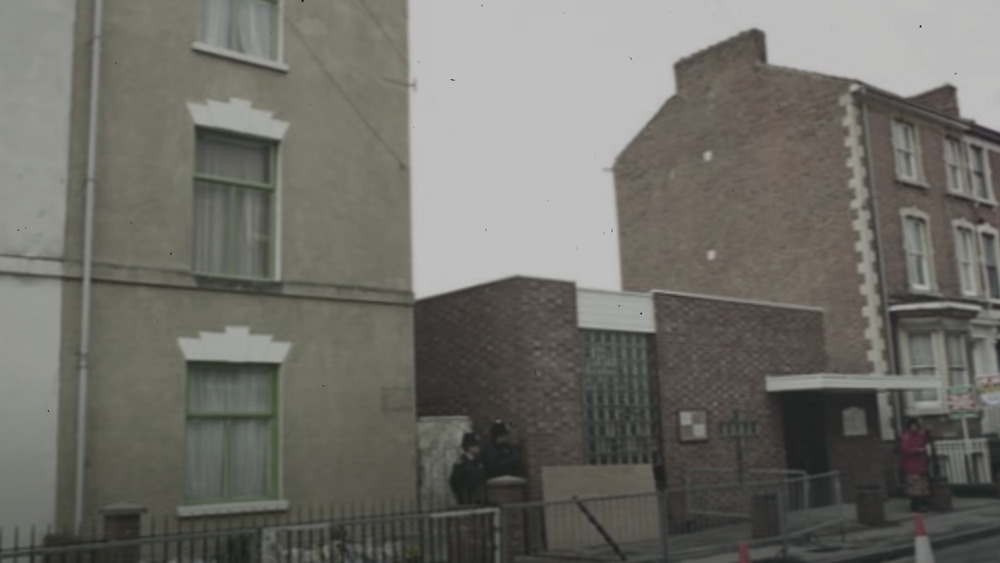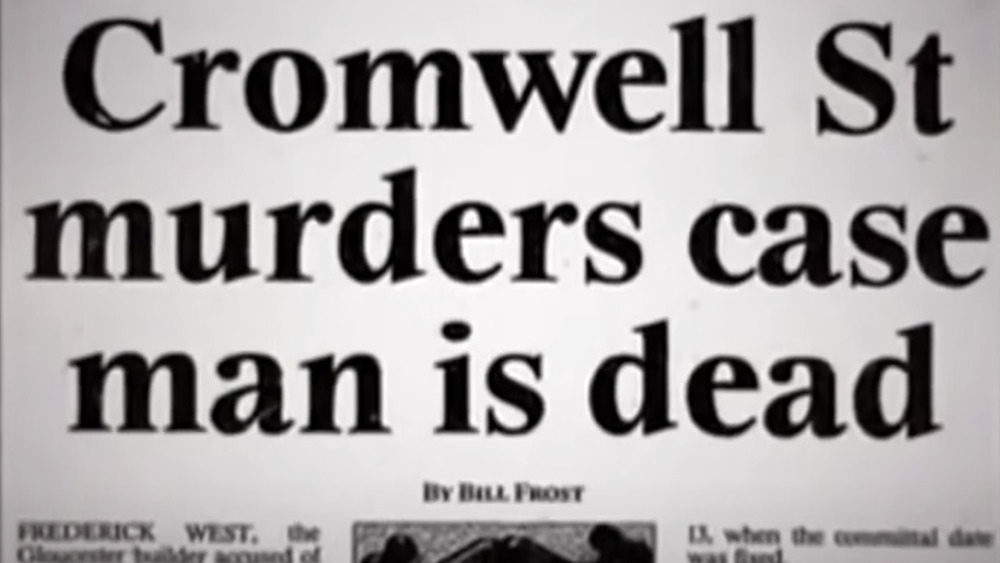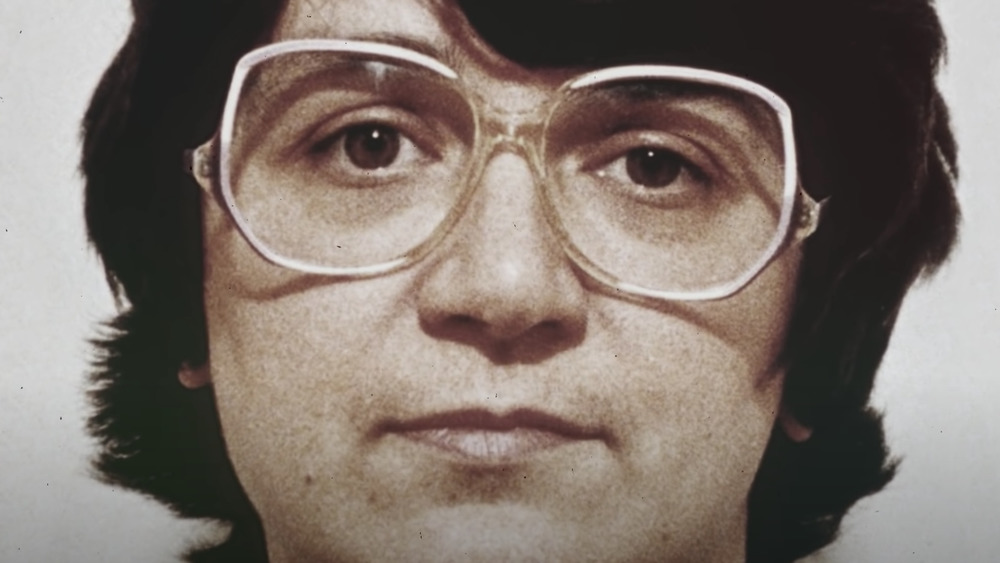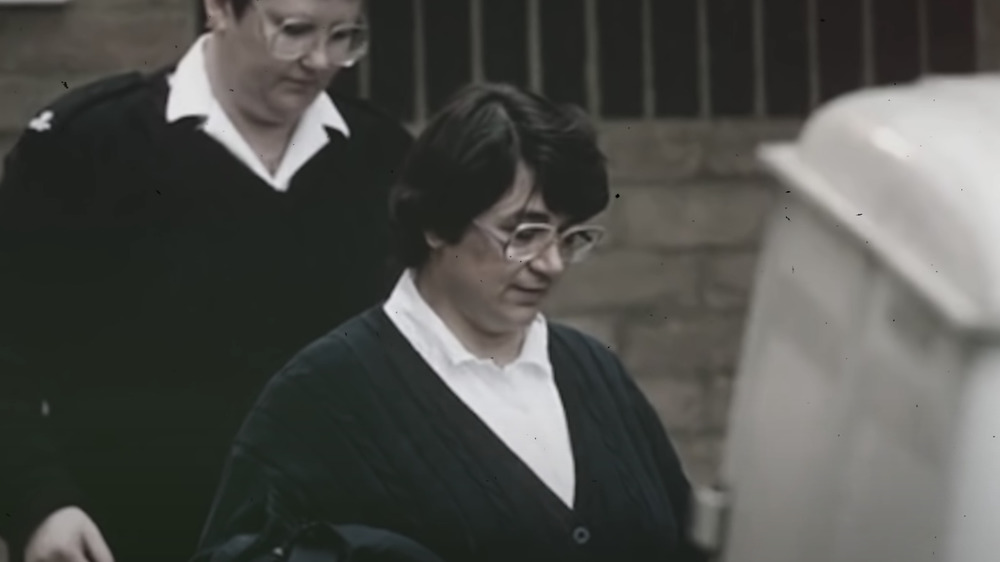The Messed Up Truth About Serial Killers Fred And Rosemary West
On February 25, 1994, Detective Constable Savage knocked at the door of Fred and Rosemary West at 25 Cromwell street in Gloucester. Both were arrested and taken to the nearest police station, where they were questioned on the disappearance of their daughter, Heather West. The following day, the police searched their property and unearthed a human bone, which doctors proved belonged to Heather, Gloucestershire Live reports.
It was the beginning of a search that, over the course of months, led the police to excavate and identify the remains of at least nine other women, who were killed and then buried in the garden or cellar of the Wests' home, aptly referred to as the "house of horror." By the end of the trial in 1995, Fred and Rosemary West came to be known as two of the cruelest and most deviant serial killers in history, making us question what human beings are really capable of. As criminologist Jane Carter Woodrow put it, "This case remains the stuff of our worst nightmares — revealing the depths of depravity and suffering that humankind is capable of inflicting on one another," per Devon Live. This is the messed up truth about serial killers Fred and Rosemary West and their gruesome crimes.
Rosemary West had a troubled childhood
Rosemary Letts was born in 1953 in Northam, North Devon, a small village surrounded by salt marshes. According to criminologist Jane Carter Woodrow's 2011 book Rose West: The Making of a Monster (via Devon Live), Daisy Letts, Rosemary's mother, had a neurotic obsession with cleaning and was clinically depressed. The doctors tried to cure her illness by giving her electroconvulsive therapy while she was pregnant with Rosemary, which Woodrow argues might have had a direct impact on Rosemary's mental health before she was even born. "Despite her pregnancy, the psychiatrist continued her treatment. This meant as Rose lay in her mother's womb Daisy had more shocks blasted to her brain, sending convulsions through her body," writes Woodrow.
As a child, Rosemary exhibted unusual behavior, "She rocked her head for hours on end and the older children complained as she rhythmically bashed her head against the cot at night" Woodrow states.
Rosemary's father, William Letts, a war veteran, was diagnosed with schizophrenia. "As Carter Woodrow discovered, Bill Letts was a paranoid schizophrenic who bullied and beat his wife into depression and tormented and abused Rose and his other six children, " The Sunday Times reports. Interestingly enough, when Daisy finally found the courage to divorce him and leave the house, taking the children with her, Rosemary decided to live with her father instead, per Biography. Rosemary was 15 at the time, and she had just met Fred.
Fred West showed signs of mental illness early
Born in 1941, Fred West was the son of a milking herdsman and a maid. He was raised on an isolated farm in Much Marcle, Herefordshire, in a low-income family. Two of his siblings died when they were still infants. On the surface, there seemed to be nothing wrong with Fred. "He was just an ordinary little lad, nothing that would stand out in your mind. He was small with a crop of curly hair and was very like his mother to look at. He was a cheerful lad," said Key Cotton, the owner of the farm where the family lived, The Independent reports.
But as an adolescent, Fred began to show signs of mental illness. He assaulted a girl who turned him down at a dance, and he once menaced another girl with his motorcycle. According to the BBC, a motorcycle accident in 1958, when he was 17, left him in a coma for a week. He had a metal plate placed inside his head, and some believe this accident might have affected Fred's ability to control his emotions and impulses.
Before meeting Rosemary, Fred West was already a killer
Before meeting Rosemary, Fred West was married to a woman named Catherine "Rena" Costello, a young waitress from Ledbury, The Independent reports. The couple had two children, Anne Marie and Charmaine. While married to Catherine, Fred started a relationship with Anne McFall, a 16-year-old girl who worked for the family. She was pregnant, and far along, when she disappeared without a trace in 1967 in Gloucester. It wasn't until years later, in 1994, that her body was found buried in a field near Much Marcle, along with the remains of her unborn child.
In 1965, Fred West ran over a three-year-old boy with an ice cream van. Fred worked as a driver at the time and claimed it was an accident, but some believe it could have been intentional. "I don't know what the child saw but it was something West would have found compromising if the boy told his mum or dad. Either involving the boy himself or a young woman or girl, who were West's primary targets and victims," writer Paul Pender told the Huffington Post.
Rosemary's parents opposed her relationship with Fred West
When Fred and Rosemary met in 1969 at the Cheltenham bus station, she was 15, and he was 27. At the time, Rosemary was still living with her father, with whom she had a twisted emotional bond. According to Jane Carter Woodrow, Fred and Rosemary's respective deviant childhoods might have brought them together. "With this background it isn't surprising that [...] when Rose met Fred West at a bus stop in Cheltenham there was an instant attraction. They believed they were made for one another," wrote Woodrow in her book, per Devon Live.
Unsurprisingly, Rosemary's father strongly opposed their relationship, possibly out of jealousy. According to City Journal, "Her parents had been so alarmed by her liaison with a man ten years older than she (though her father had himself sexually abused her) that they delivered her up to the care of the local social services department, which, however, permitted her to continue to see Fred." When Rosemary turned 16 — legally old enough to decide for herself — she went to live with Fred.
Rosemary West killed her stepdaughter
Fred West was still legally married to Catherine Costello when he met Rosemary. When the couple finally got together in late 1969, Rosemary left her job and moved in with Fred to care for Charmaine and Anne Marie, Fred's daughters from his previous marriage. But Charmaine and Rosemary didn't get along. "There is clear evidence that Charmaine was greatly disliked by Rosemary West," prosecutor Brian Leveson told the jury during the trial, The Independent reports. Charmaine was an unruly child, and Rosemary would often punish her for her behavior.
In 1971, while Fred was in jail — he had been sentenced to ten months for "dishonesty offenses" — eight-year-old Charmaine disappeared. Rosemary claimed that Charmaine had gone to live with her mother. Charmaine's remains were found in 1994 at 25 Midland Road, where the couple lived at the time. The previous year, Catherine Costello, Charmaine's mother, had also disappeared. In March 1970, the 25-year-old vanished, though the police weren't notified. Catherine's family heard that she'd moved to Saudi Arabia, but her remains were found in 1994, per The Independent.
Fred and Rosemary West's victims were young women
According to The Independent, the remains of at least eight bodies were found at Fred and Rosemary West's house at 25 Cromwell St., where the family had moved in 1971, bringing the couple's total victim count to 12. But the truth is that we will never truly know how many people Fred and Rosemary West killed during their lifetime. It's possible that there could be more.
The known murders they committed together took place from the early 1970s to the late 1980s. The victims were usually young women who came from low-income neighborhoods, which made it easier for Fred and Rosemary to lure them in their house with the promise of employment and later get rid of them. "Most of the Wests' victims were picked up by the wayside. The majority of them — though not quite all — were rebellious and difficult teenagers from broken homes, who had either run away from home or had been in the care of the social services," writes Theodore Darlymple in City Journal. Some of the girls worked for the Wests as babysitters or maids, and most of the time, their disappearances weren't even reported to the police.
The victims were then tortured, sexually assaulted, and held prisoner in the couple's cellar for days before they were finally killed and buried in the family's backyard, Gloucestershire Live reports.
One of the victims was 18 and pregnant
When 18-year-old Shirley Robinson disappeared in May 1978, she had been working for the Wests as a babysitter, and she had gotten romantically involved with Fred West. When she got pregnant with his child, Rosemary didn't take it well. "Rosemary became jealous because West was so fond of Shirley and tension rose. She was never reported missing, and friends were told she had gone to Germany to visit relatives," The Independent reports. Her remains were later found alongside those of her unborn child, buried in the garden at 25 Cromwell St. She wasn't the only one.
Among Fred and Rosemary West's victims were other young women like Shirley: Alison Chambers, a 17-year-old runaway teenager, disappeared in 1979. Lynda Gough, a 19-year-old seamstress, vanished in 1973. Juanita Mott, an unemployed 18-year-old girl, was last seen in 1975. Her sister Belinda disappeared five years later. Carole Ann Cooper, age 15, never made it to her grandmother's house from the bus stop where she was last seen in 1973. Shirley Hubbard, a 15-year-old sales worker, went missing in 1974. Therese Siegenthaler, an 18-year-old Swiss college student, was hitchhiking to Ireland while on vacation in 1974 and never arrived. Another student, 19-year-old Lucy Partington, was staying with friends near the West house. In 1973, she was waiting for the bus and was never seen again, The Independent reports.
Fred West killed his daughter
In 1987, 16-year-old Heather West, Fred and Rosemary's oldest daughter, disappeared without a trace. According to The Independent, her remains were the first to be found by the police when they searched the Wests' home in 1994. "It is quite clear that there were growing frictions between the Wests and their oldest daughter. This may have been the normal problems of adolescence, it may have been more serious problems," stated prosecutor Brian Leveson.
According to City Journal, Heather refused to comply with what was happening in the house. She rebelled against the abuse she was forced to suffer, and because of this, she was killed by her father. To explain her mysterious disappearance, Fred and Rosemary West told their children that their sister had gone to work for a vacation camp. "She was the last person to be buried at 25 Cromwell Street, and her parents set up the family barbecue precisely over the site of her grave," the magazine states.
The beginning of the end for Fred and Rosemary West
In 1992, Fred and Rosemary West were accused of rape, and it was the beginning of the end for them. According to Crime + Investigation UK, it caught the attention of Detective Constable Hazel Savage. Per City Journal, while gathering evidence, she became suspicious of the Wests and wanted to interview Heather. Of course, Heather was nowhere to be found, which prompted the police to start a broader investigation.
In spite of the overwhelming amount of evidence against the Wests, it wasn't until February 1994 that the police finally got a warrant to search their home. While the ensuing trial sparked horrified reactions all over the country, many asked what could have possibly taken so long. "I take a lot of the blame myself, and my whole family does, but not all of it. Surely there was someone out there, social, welfare, school teachers, no end of people who could or should have done something?" said Brian Letts, Rosemary's brother, during the trial, per The Independent. Or as writer Theodore Darlymple put it in City Journal, "The West case revealed how easily, in the anonymity of the modern urban environment, and in the midst of crowds, people may disappear."
Fred West committed suicide
Fred and Rosemary West were finally arrested on February 25, 1994, and the police soon began to unearth human remains from the Wests' garden and cellar. Their arrest "triggered one of the biggest police investigations in recent times," as The Independent stated, including a search that cost the police departments hundreds of thousands of pounds.
According to City Journal, while in custody, Fred started to confess, even though he often told inconsistent stories about the killings, which made it hard for the prosecutors to establish the truth. The serial killer began writing his autobiography, which was titled I was Loved by an Angel, and he even wrote his own epitaph, romanticizing his marriage to Rosemary: "In loving memory/FRED WEST ROSE WEST/Rest in peace where no shadow falls/In perfect peace he/waits for Rose, his wife."
Less than a year after his arrest, on January 1, 1995, Fred West was found hanging in his prison cell in Winson Green, near Birmingham. He committed suicide while awaiting trial, the BBC reports.
Rosemary West was sentenced to life prison
After the arrest, Fred confessed, but Rosemary insisted that she was innocent. By the end of the month-long trial in 1995, though, the jury found Rosemary West guilty of the murders of ten women, and she was sentenced to life imprisonment. The verdict came after one of the most shocking trials in criminal history. "If attention is paid to what I think, you will never be released," Mr. Justice Mantell told Rosemary West, the BBC reports.
Two years later, in 1997, Home Secretary Jack Straw made her sentence a whole life tariff, an extraordinarily severe punishment reserved for the most dangerous criminals and one which means West will spend the rest of her life in prison.
According to Gloucestershire Live, West is currently serving her sentence in Durham prison. She has never confessed to the murders. Fred and Rosemary West's house at 25 Cromwell St., which became a sinister tourist destination in the aftermath of the murders, was demolished and replaced with a walkway, according to the BBC.
One of the Wests' surviving daughters tried to kill herself
Fred and Rosemary West's story might not be at the center of the news nowadays, but the children who survived the house of horrors are still dealing with the consequences of their parents' crimes. "I couldn't get a bank account, or a loan or anything. You would fill in 25 Cromwell Street as your previous address, and they either thought it was a joke and chucked the form away, or didn't want to know," said Mae West explaining why she decided to change her name, the Independent reports.
In 1999, Anne Marie West tried to commit suicide by jumping off a bridge. She was rescued and survived, but she wished she hadn't. "I can still taste the fear. Still feel the pain. It's like going back to being a child again," she told journalists, The Guardian reports.
But should the West children be paying for what their parents did? "I'm not ashamed. We didn't do anything wrong, so why should I leave my home? [...] A lot of people would like nothing more than to see us fall to bits, and I won't," Stephen West told journalists, per The Independent.
If you or anyone you know is having suicidal thoughts, please call the National Suicide Prevention Lifeline at 1-800-273-TALK (8255).
